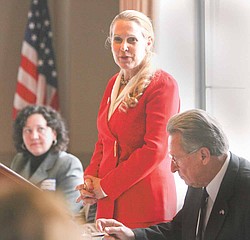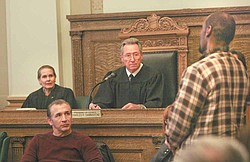Youngstown Veterans Treatment Court has inaugural session
The Vindicator (Youngstown)
Ohio Supreme Court Justice Evelyn Stratton, center, was the main speaker at the inaugural session of the Veterans Treatment Court, under the auspices of Judge Robert P. Milich of Youngstown Municipal Court, right. Justice Stratton is a longtime supporter of special courts for veterans.
The Vindicator (Youngstown)
Youngstown Municipal Judge Robert P. Milich presides over the first session of the Youngstown Veterans Treatment Court on Wednesday in city council chambers. At right is Todd Stratton, a veteran who applied to participate in the Treatment Court’s program, which if completed, can keep him from going to jail. Looking on is Ohio Supreme Court Justice Evelyn Stratton and former professional boxer Ray “Boom Boom” Mancini, who is interested in veterans issues.
YOUNGSTOWN
“We have to wrap our arms around these kids coming home from Iraq and Afghanistan and the older veterans from other wars,” said Ohio Supreme Court Justice Evelyn Stratton at the inaugural session of the Youngstown Veterans Treatment Court.
“We sent them off to war, and they came back changed. We have to treat them differently,” said Justice Stratton, whose father was a World War II veteran, and who was instrumental in getting the Veterans Court and before that the Mental Health Court started in Mahoning County.
“This court might give them a chance to reclaim their lives,” she said Wednesday at a court session in Youngstown City Council chambers.
The Veterans Treatment Court is housed in Youngstown Municipal Court under the auspices of Judge Robert P. Milich, a retired Air Force lieutenant colonel who served four years on active duty and 24 years with the 910th Airlift Wing at the Youngstown Air Reserve Station in Vienna.
Veterans can apply to participate in the treatment court who have been charged with a nonviolent misdemeanor offense and who also have a clinical diagnosis of substance dependence, a mental health disease, traumatic brain injury or a co-occurring disorder.
If they complete the treatment program, they can avoid going to jail.
Violent offenders will also be considered under special circumstances. Veterans need not have served in combat to be eligible.
Three veterans appeared in court and applied to participate in the program, including one who had served four years in the Marine Corps.
Judge Milich told him the Veterans Treatment Court program is “tougher than boot camp. You’ll be signing a contract. This is about getting straight,” he said.
The program functions primarily with volunteers from the court staff and the community.
The treatment court team includes a treatment provider, a veterans justice outreach specialist from the Department of Veterans Affairs, and representatives from the Ohio Department of Rehabilitation and Correction, Youngstown State University, the city prosecutor’s office, the police department, and the municipal court.
Also, John P. Brown III, past national AMVETS commander, is coordinating the Ryan A. Yurchison Mentor Group. Yurchison served in Kuwait and Iraq in 2005 and 2006 and was honorably discharged in 2007. He is one of two sons of Cheryl DeBow, a municipal court probation officer. Yurchison died May 22, 2010, as a result of effects of the war. Ryan’s brother, Michael J., is also a combat veteran.
Brown said 20 people have volunteered to be mentors. Their job will be to take care of veterans who need help navigating the court system and getting to appointments and “toeing the line so they can get back to being productive citizens.”
“I like the idea of mentors. They will help the veterans not be intimidated by the process,” said Ronald Marian, executive director of the Mahoning County Mental Health Board. He also said Mahoning County has the support system to help the veterans.
Lonnie Jones of Campbell, who served in the Army from 1966 to 1968, including 13 months in Vietnam where he was wounded, is one of the volunteer mentors.
“The GI Bill got me through college, but when I came out of Vietnam there was no help like this. I was wounded by shrapnel, but I think the emotional issues were worse,” he said.
“I think I can help these veterans because I’ve been through it, and I understand the transition from military to civilian life is tough,” Jones said.
Harry Meshel, former Ohio state senator and a YSU trustee, praised formation of the Veterans Treatment Court.
“The veterans served this country very well, and now it’s time for the people to serve the veterans,” he said.
 43
43


